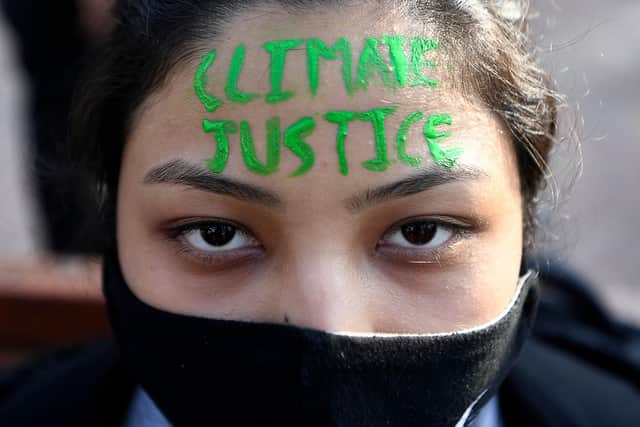COP26: Will Glasgow climate summit settle moral issue of climate reparations? – Martyn McLaughlin
Unfortunately, the principles of losses and damages have remained the poorer relations, elephants in the room inside Glasgow’s sprawling SEC complex.
On Monday, the daily theme at COP26 skirted around these issues with the usual cavalcade of workshops, discussion panels, and earnest speeches by junior ministers, banking executives, and NGOs. Representatives from marginalised nations fearing for their very future heard little to dissuade them from the notion that nowhere near enough is being done to help them.
Advertisement
Hide AdAdvertisement
Hide AdSince the idea that industrialised, higher income countries should bear the financial burden of climate-related compensation payments was first raised by the Alliance of Small Island States some 30 years ago, it has staunchly remained on the periphery of every major climate summit.
There was some progress in 2013 with the establishment of the Warsaw International Mechanism for Loss and Damage, and the creation of the Santiago Network in 2019. But for the most part, there have been too many false dawns.
Six years ago, for example, there was much fanfare at COP21 when the concepts of loss and damage in relation to the adverse effects of the climate crisis made it into article eight of the Paris Agreement. The footnotes to the text, however, made clear that their inclusion was little more than lip service, stating that it “does not involve or provide a basis for any liability or compensation”.
That particular clause was insisted upon by the US negotiating team, who warned that otherwise, they would not agree to the overall deal. What was that about huddled masses yearning to breathe free?
In Glasgow, such intransigence remains, and the vague promises made in Paris have so far gone unmet. The wealthiest nations are still pushing back against any talk of compensation for the damage inflicted by climate change, much to the frustration of those who have been calling for change.


“Everyone knows that rich countries are afraid of making themselves open to liability and compensation,” said Saleemul Huq, director of the International Centre for Climate Change and Development in Bangladesh. “Even the term ‘loss and damage’ is, in fact, a euphemism for liabilities and compensation. They refuse to address this issue.”
Unsurprisingly, the fundamental reason for such obstinacy is money. With no universally agreed framework, it is notoriously difficult to quantify the amount of damages that each major developed nation would have to pay, but even a conservative estimate would suggest that the sums are significant.
The US – the country which has produced the most carbon dioxide emissions since the beginning of the industrial era – would have to pay somewhere in the region of £1.5 trillion. The UK, which has released around 75 GtCO2 since 1850, would also face a huge bill.The climate debt we owe to the Global South is gargantuan, and it is growing day by day.


Advertisement
Hide AdAdvertisement
Hide AdSome developing countries have made the compelling argument that there is a legal duty for the big historic polluters to provide remedies based on the no-harm rule, a widely recognised principle of international law which compels countries to prevent, reduce, and control the risk of environmental harm to other states.
There is historic precedent for this, and remarkably, it stretches back 80 years to a dispute over a smelter in Canada which produced smoke that damaged forests and crops in Washington state. A landmark tribunal decision subsequently ordered Canada to provide damages to its neighbour, and set out the principle that the polluter must pay up.
Even so, the legal basis for damages in the case of the climate emergency is not the most compelling justification that developing nations have at their disposal. There is an overwhelming moral case for action which should take primacy over any other argument.
The climate debate is too often caught up in technical and economic minutiae, but it is important to frame it not just as an ecological disaster, but as an ethical catastrophe. Unless it is addressed, it will be a source of continuing shame. As Danny Sriskandarajah, the chief executive of Oxfam GB, put it: “Climate action without climate justice, I think, is morally and technically bankrupt.”
Against this, it should be a source of pride that one nation – Scotland – has broken the longstanding taboo around climate justice. The £1m provided by the Scottish government to help the world’s most vulnerable communities tackle climate change-related loss and damage will not go far, and it is mere pocket change compared to the sums required.
But it is a symbolic and groundbreaking payment from a nation which once formed a key industrial hub of the British empire, and it throws down the gauntlet to other developed nations.
The signs so far indicate that no one is ready to pick it up, and that national self-interest will again prevail. If COP26 cannot deliver the $100 billion (£74 billion) annual crisis fund that was promised as long ago as 2009, the concept of a climate justice fund looks like an outlier.
But pressure is growing, and with the field of attribution science continuing to show how human activities such as energy production and transport are causing extreme weather events, the calls for a new financial mechanism, such as an international commission, to deliver reparative justice to those who have suffered the most will prove increasingly difficult to resist.
Advertisement
Hide AdAdvertisement
Hide AdIt is a vexed, messy issue, complicated by questions about colonialism, historic exploitation, and geopolitical clout. At its heart, however, is a chance for long overdue acknowledgement and accountability. There is still time in Glasgow for a moral reckoning, but the clock is ticking.
A message from the editor:
Thank you for reading this article. We're more reliant on your support than ever as the shift in consumer habits brought about by coronavirus impacts our advertisers. If you haven't already, please consider supporting our trusted, fact-checked journalism by taking out a digital subscription.
Comments
Want to join the conversation? Please or to comment on this article.
